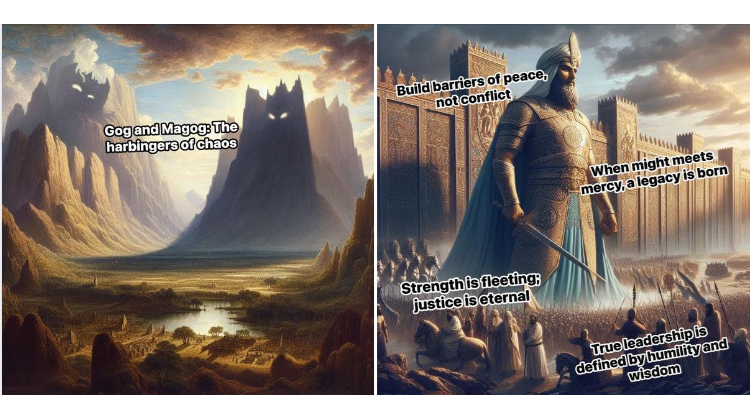
Long ago, when the world was still being shaped by conquests and kingdoms, there lived a mighty ruler, known as Dhul-Qarnain (See 18:83-99 in the Quran. Some say he was a king from Persia, a land now known as Iran. Others believe he was King Cyrus, as mentioned in the Bible. But whoever he was, his fame spread far and wide, not just for his power, but for his wisdom and unwavering sense of justice.
Dhul-Qarnain was not an ordinary king. The Almighty had granted him immense authority and resources, and he wielded these powers responsibly. He knew that being a ruler was not merely about conquering lands but about protecting the dignity and lives of people. Human nature, as created by the Almighty, has a potential for both good and evil. One person’s unchecked ambition could become a danger to the life and honor of others. Recognizing this vulnerability, he understood that the role of a ruler was to maintain safety and order.
Without a system of governance, people would be locked in endless conflicts, fighting over territory, power, and pride. A city or nation without leadership is unimaginable—it would be like a ship in a storm without a captain, destined to be wrecked by the waves of chaos. Only a structured government, based on justice, can provide people with the security they need to live and thrive.
Dhul-Qarnain’s journey took him to many lands. With each conquest, he spread peace and justice. His travels brought him to the place where the sun seemed to set—a distant land where the light faded into murky waters at the horizon. Here, he found a people living in a place far removed from the order and stability of his kingdom. The Almighty gave him a choice: to either punish the wrongdoers or treat them with kindness. Dhul-Qarnain chose the path of a just ruler. He punished those who oppressed others and rewarded those who upheld goodness. He never let his power blind him; instead, his conscience guided him, knowing that the true Judge was not himself but the Almighty, who would hold him accountable for every act.
As he continued his journey, Dhul-Qarnain came across another group of people, nestled between two mighty mountains. They were a simple and fearful community, trembling at the thought of the destructive tribes of Gog and Magog, who would sweep down from the mountains, plundering, destroying, and leaving nothing but sorrow in their wake. Desperate, the people pleaded with Dhul-Qarnain for help, offering him tribute in exchange for his protection. But Dhul-Qarnain was not a ruler who exploited the helpless. Instead, he saw his role as a protector of the weak, and his heart moved with compassion.
Rather than engaging in direct conflict with Gog and Magog, he chose to construct a barrier instead.
“I do not need your wealth,” he told them, “but I will help you with what the Almighty has blessed me with. Let us build a barrier together to protect your community.”
Under his guidance, the people gathered iron and molten copper. Stone by stone, metal by metal, they constructed an enormous wall that sealed the pass between the mountains. It was a monumental structure, standing tall and unyielding—a barrier that would keep the ravaging tribes at bay. When they finally completed it, Dhul-Qarnain stood before it and prayed, recognizing that his power alone had not made this possible.
“This is a mercy from my Lord,” he said humbly, “but when the will of the Almighty comes to pass, even this barrier will crumble.”
For despite its strength, Dhul-Qarnain knew that no human endeavor, no matter how mighty, could stand against the will of the Almighty forever. This wall, which was a symbol of protection and safety, would only last until the Day decreed by the Almighty.
The story of Dhul-Qarnain reminds us that power, no matter how great, is fleeting. Even kings and conquerors, and super powers are subject to the divine plan. Dhul-Qarnain’s greatness lay not in his conquests but in his humility, his sense of justice, and his unwavering recognition that true power belongs to the Almighty alone. He used his resources not for personal gain, but for the welfare of those who sought his help, always mindful that every deed would one day be judged.
And so, the mighty ruler continued his journey, carrying with him the lessons of humility and faith, leaving behind a legacy not just of walls and barriers, but of just leadership and the eternal truth that all human efforts are temporary before the supreme decree of the Almighty. Thus, the legacy of Dhul-Qarnain lived on, not just in the pages of history, but in the actions of those who chose to build rather than destroy, to protect rather than exploit, and to stand firm against the forces of chaos with the enduring strength of justice.

